With the Peoria Innovation Alliance officially opening its physical space in downtown Peoria, Executive Director Jake Hamann says its priorities will focus on finding solutions to the city’s biggest problems through civic entrepreneurship.
“The key thing is getting out into the community so that we're visible, people can see that we're making a difference and starting to do some things in the community, specifically in this nine block area of the Innovation District,” Hamann said Wednesday afternoon at a ribbon-cutting ceremony for the Center for Civic Innovation on the lower level of the First Mid Bank and Trust building.
“It's really less about the space, but about the activity that's going to go on here: the people that are going to be here and the activities and the mindset around trying to tackle and solve some of those problems.”
Philip Lockwood, president of the Peoria Innovation Alliance board of directors, noted having a presence in the heart of the city is ideal.
“As much as we have been developing this mindset of entrepreneurship and a culture of entrepreneurship and building those for-profit entities, we're also very much about how we can build social entrepreneurship and address challenges we face throughout our community. So being able to have a place ... centrally located, that we can bring people together is awesome.”
Hamann said the motivation to apply innovative tools and processes to finding solutions emerged from the Big Table initiative and a “Civic Innovation Week” held in December 2019 — before the COVID-19 pandemic slowed the plans.
“You look at some of the issues that were brought up as part of the Big Table: poverty, access to health care, innovation and entrepreneurship in general, the economy in general,” he said. “I think a lot of that has to start somewhere, right?
“How can we use this space and the brain power as a nucleus to kind of take it and move it out into the community? So that's really what we want the space to be, kind of the place where those ideas start and then go out into the community from here and take those to the people that need it the most.”
Lockwood pointed to his Smart Cities initiative as one example of how innovation can address those community problems.
“We're working to define an area within our city where we're collecting as much information as we can in data, and then we'll use that to start convening groups and work on identifying themes that we can address issues that are actually germane to those people who live in those areas,” said Lockwood.
“As we go along, our role within the Peoria Innovation Alliance really is to facilitate entrepreneurship and try to also connect other resources so that we put those entrepreneurs at the center and draw upon the resources that exist. Ultimately, it gives us a medium in which we can communicate with other agencies and organizations that are interested in helping the community to do more.”
Joshua Gunn, president and CEO of the Peoria Area Chamber of Commerce, said he’s impressed by the approach the Peoria Innovation Alliance is taking.
“We talk often about the challenges that face our community, and oftentimes they can feel overwhelming,” said Gunn. “It can feel like, ‘Man, how do we ever solve for some of the disconnect or disparity in our community?’ What I love about the model that Jake and Philip have adapted is, they take those big-picture problems and apply design-thinking and entrepreneurial practices to solving problems that impact all of us.
“It's not just entrepreneurship so that someone makes a ton of money and exits with billion-dollar exit — which is great too, right? But it's entrepreneurship for the sake of solving problems that impact us every single day.”
There’s no subscription fee to listen or read our stories. Everyone can access this essential public service thanks to community support. Help fund your public media with a contribution to WCBU or WGLT.


